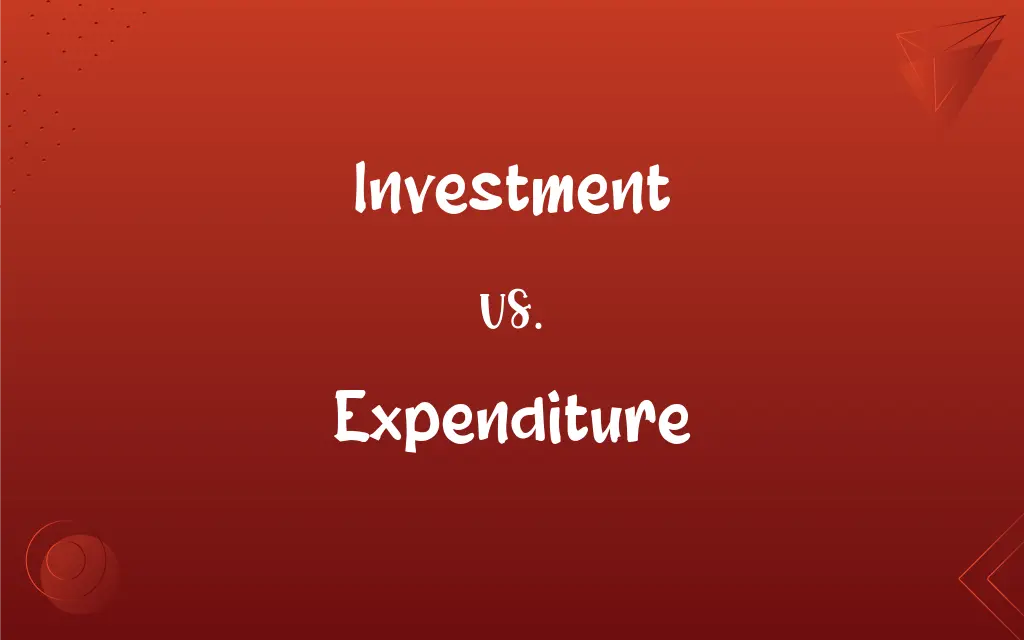Investment vs. Expenditure: What's the Difference?
Edited by Aimie Carlson || By Janet White || Published on December 30, 2023
Investment is the allocation of resources for future profit or benefit, while expenditure is the spending of funds on goods, services, or obligations.

Key Differences
Investment involves committing resources, like money or time, with an expectation of future financial return or benefit. Expenditure refers to the outflow of funds for immediate consumption or paying off liabilities.
Investments are often made in assets like stocks, bonds, or property, with the intent of asset growth or income generation. Expenditures, on the other hand, include routine spending on operational costs, bills, and purchases.
The purpose of investment is to generate wealth over a longer period, often accepting short-term risk. Expenditure is typically a part of regular financial management for immediate needs or obligations.
Investments can lead to capital appreciation, dividends, or interest earnings. Expenditures, however, do not usually yield direct financial returns but are necessary for maintaining operations or lifestyle.
Investment decisions often require analysis and strategic planning. Expenditures are often recurrent and are part of day-to-day financial activities.
ADVERTISEMENT
Comparison Chart
Purpose
To earn future profits or benefits
To pay for goods, services, or liabilities
Timeframe
Long-term focus
Short-term or immediate use
Expected Return
Potential for financial return or asset growth
No direct financial return
Nature of Spending
Strategic and analytical decision-making
Routine, operational, or obligatory spending
Examples
Purchasing stocks, real estate investment
Buying groceries, paying utility bills
ADVERTISEMENT
Investment and Expenditure Definitions
Investment
Allocation of resources for future profit.
His investment in the stock market paid off well.
Expenditure
Outflow of funds for goods or services.
Their biggest expenditure was their mortgage payment.
Investment
Expenditure with the expectation of higher future return.
Investing in education can lead to better career opportunities.
Expenditure
Disbursing funds for immediate needs.
Expenditure on health care should not be compromised.
Investment
Putting money into assets for growth or income.
They considered real estate a good long-term investment.
Expenditure
Financial outlay for current consumption.
Travel expenditure was a significant part of their budget.
Investment
Spending money with the aim of gaining profit.
Her investment in solar panels was both eco-friendly and cost-effective.
Expenditure
Money spent on operational costs.
The business increased its expenditure on marketing.
Investment
Committing resources in a business or project.
The company’s investment in new technology increased its efficiency.
Expenditure
The act or process of expending; outlay.
Investment
The act of investing.
Expenditure
An amount expended.
Investment
An amount invested.
Expenditure
An expense.
Expenditure
Act of expending or paying out.
Expenditure
The amount expended; expense; outlay.
The expenditure of time, money, and political capital on this project has been excessive.
Expenditure
The act of expending; a laying out, as of money; disbursement.
Our expenditure purchased commerce and conquest.
Expenditure
That which is expended or paid out; expense.
The receipts and expenditures of this extensive country.
Expenditure
Money paid out
Expenditure
The act of spending money for goods or services
Expenditure
The act of consuming something
Expenditure
Spending or using up of money.
The family’s monthly expenditure on groceries was consistent.
FAQs
What are common types of investments?
Common types include stocks, bonds, real estate, mutual funds, and retirement accounts.
What is a return on investment (ROI)?
ROI measures the gain or loss on an investment relative to its cost.
What is diversification in investing?
Diversification is spreading investments across various financial instruments to reduce risk.
How does risk relate to investment?
Generally, higher potential returns on investment are associated with higher risk.
What is a long-term investment?
Long-term investments are held for several years, often to meet future financial goals like retirement.
What is a short-term investment?
Short-term investments are typically held for less than a year and are more liquid.
What are the types of expenditures?
They include operational (day-to-day spending), capital (long-term investments in assets), and non-operational (like debt repayments).
How does expenditure differ from expense?
Expense usually refers to smaller, more routine transactions, while expenditure can be larger and less frequent.
What is an investment?
Investment refers to the allocation of resources, usually money, into assets or endeavors expected to yield future financial returns.
How does inflation affect investments?
Inflation can erode the purchasing power of investment returns, making it important to seek investments that outpace inflation.
Can investments have non-financial goals?
Yes, like in social or environmental impact investments aiming for positive outcomes beyond financial returns.
What is an expenditure?
Expenditure is the act of spending money or resources, usually for goods, services, or obligations.
What is revenue expenditure?
Revenue expenditure is spending on short-term items like salaries, rent, and utilities.
Why is managing expenditure important?
Effective management ensures financial stability, enabling meeting obligations and goals.
Why is investment important for economies?
Investments stimulate economic growth, create jobs, and fund new technologies and infrastructure.
What is capital expenditure?
Capital expenditure (CapEx) is spending on physical assets like property, buildings, or equipment.
What is discretionary expenditure?
Discretionary expenditure involves spending that can be adjusted or delayed, like travel or entertainment.
What is a fixed expenditure?
Fixed expenditures are recurring and unchangeable in the short term, like mortgage payments or insurance premiums.
Can expenditure drive economic growth?
Yes, especially government and consumer spending can stimulate economic activity and growth.
How do governments manage expenditures?
Governments manage expenditures through budgets, prioritizing spending to meet public needs and obligations.
About Author
Written by
Janet WhiteJanet White has been an esteemed writer and blogger for Difference Wiki. Holding a Master's degree in Science and Medical Journalism from the prestigious Boston University, she has consistently demonstrated her expertise and passion for her field. When she's not immersed in her work, Janet relishes her time exercising, delving into a good book, and cherishing moments with friends and family.
Edited by
Aimie CarlsonAimie Carlson, holding a master's degree in English literature, is a fervent English language enthusiast. She lends her writing talents to Difference Wiki, a prominent website that specializes in comparisons, offering readers insightful analyses that both captivate and inform.






































































